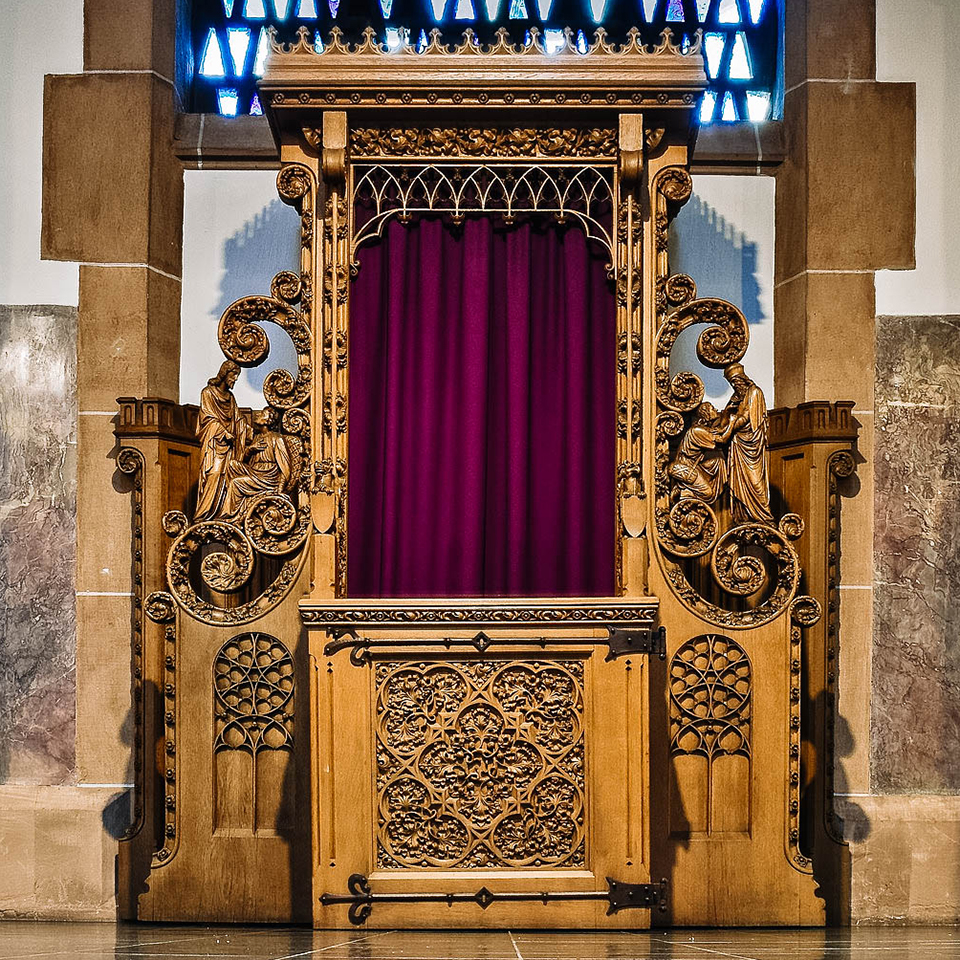Cleaning out a bookshelf, I found this thought scrawled—uncharacteristically for me—in the back of a book I’d brought on retreat some years ago. Since we’re all thinking of our mortality these days—the COVID-19 virus and its worldwide impact has brought us a Lenten season that is decidedly Memento mori in mood—I thought I’d share it.
When we meet God face to face, it is always a moment of grace,but too it is a moment of judgment for us.Judgment day, then, can be any day, any time, any particularmoment of an hour.And so our death can happen many times,a process of conversion, a process of turning to.We die to ourselves, die to a particular sin or attachment,and begin again, turning toward.We no sooner die to one thing that we immediatelyattach and live to another,and judgment will come to that too.Sacrament of Confessionhastens our dying and our rising,the dying to the old self,the rising to the new,always, always, toward Christ.Toward oneness, completion.The Whole.Life is a process of Incarnation.Our reality, our wholeness, our completenessin this world comesthrough repeated offerings that we receive or refuse.The Eucharistic Christ contributes to this formation, this process.He enters us, we welcome him.One flesh.Incarnation.My whole woeful life just begun, again.
I guess I’d been thinking about confession when I wrote that, and I am thinking about it again as our churches are closed and our sacraments have been rendered temporarily unavailable to us in an effort to protect human life from a ruinous scourge.
To have any of the sacraments kept from us at such an anxious time is, of course, upsetting. We miss the consolations of the liturgy, the common worship within the Mass, having physical Communion with Christ Jesus. Our infants are not being baptized, and First Communions are being held off. Anointing of the Sick is happening as it can, either in hospitals or via priests who are making a lot more house calls than they had of late. It all has me, as it does so many Catholics, looking forward to the day when we can again celebrate all of our sacraments together.
But confessions being less available is bothering me on a different level, probably because we are all are thinking of our own mortality more than usual, and are therefore hungering for the sacrament—for the formal reconciliation with heaven it brings, and for the words “I absolve you in the name of the Father and the Son and the Holy Spirit” to be uttered in our hearing.
Of course, we know that in the very first moments of our contrition—as soon as we bring our remorseful apologies to the most merciful God—our sins are forgiven. But aside from bringing us into a state of grace (as Chesterton said, we emerge from the confessional “five minutes old”), the sacrament of Confession, like all of the sacraments, brings all of our senses into the encounter with God, rending it holistic and healing. Confession, though absolutely confidential, forces us to speak our sins to another. We know that “to name a thing” is to gain some measure of power over it, and the graces of the sacrament further assist us in that. But to say aloud what we have done, what we have failed to do, and then talk about why with another; to ponder the other’s thoughts on all of that; to pray our contrition; and to finally hear, from the mouth of a priest acting in persona Christi, the words “You are forgiven, go in peace”—all of it works together to strengthen us in spirit, in mind and heart and body too. There is tremendous weight in all of that, which helps to keep us grounded.
When we are in fear for our lives, the words of absolution help us find our way into a “happy death”—one where we may depart our bodies with no fear, but only a hope of heaven before us.
Since the advance of the coronavirus, I’ve been a little bit anxious for the sake of those Catholics who fear dying without access to confession—who believe heaven will be closed to them without participation in the sacrament. I’m anxious for their own anxiety. I am worried that—especially should they become ill—they will be burdened with a terror of hell that they needn’t carry, and which cannot help their recovery.
The older people in my family have spoken of that fear, wondering what will become of their immortal souls if there is no sacramental absolution, no assurance that any last rites will be offered to them. They are interested (and happy) to learn that God is trustworthy in his all-knowingness; that the God who created our inmost beings and knows our intentions can be trusted to know that we wish for reconciliation, to know whether our repentant hearts have been directed toward a sacrament that has simply become unavailable to us.
Some priests have been offering “drive-by confession,” whereby one may pull into the parish parking lot and confess while seated in one’s car, a priest seated six feet or so away. Perhaps more parishes will offer similar opportunities for their parishioners—ways for them to speak their sins and hear the words of absolution so they may carry no additional fear within their hearts, and remain reconciled to heaven.
We need all of our sacraments, all the time. Those of us in the prosperous West are discovering what so many of our brothers and sisters in developing countries already know: that it is rough sailing without the Mass, and without the rest of it.
And right now, we especially need the sacrament of Confession to rightly orient us when we have shifted off course or headed into dark currents that can lead us far from the destination we seek. But when the sacrament is simply not available to us, it is reassuring to know that God is trustworthy in every circumstance, particularly when the circumstances are so strange and new, and have brought us into such uncharted waters.

